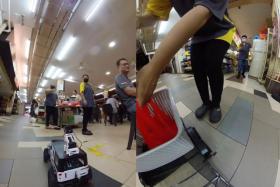Singapore is the world’s top digital society: Study
US comes in second, followed by China and Denmark in British survey
Singapore has emerged as the top digital society, with more citizens trusting technology and reaping its benefits, compared with their counterparts in the United States and China, according to a study of 24 countries.
But the study, done by British media and digital marketing communications company Dentsu Aegis Network, also found that a higher than average number of Singaporeans are aware of the negative effect technology can have on their well-being.
The results of the survey, which polled more than 43,000 people from July to August last year, were released yesterday. It was done in collaboration with analysis firm Oxford Economics.
The US came in second, followed by China and Denmark.
Last year, Britain took the top spot. The US came in second and China third.
This is the first time Singapore has been included in the company's annual Digital Society Index study, which is in its second edition.
Singapore is the top digital society according to the firm because it ranked high across three matrices the survey used: dynamism, trust and inclusion.
Dynamism is the strength of a country's core digital sector, while trust refers to the extent to which people have trust in data use as well as broader optimism about the future.
Singapore ranked second when it came to these two indicators.
ACCESS
The Republic was also found to have the seventh-highest level of inclusion, which is the access people have to the benefits created by a country's digital economy.
But Dentsu Aegis Network also found that there is "an imbalance" in how Singaporeans feel towards the digital economy.
Compared with the global average, more Singaporeans felt their basic, self-fulfilment and societal needs were met - but fewer felt that their psychological ones were addressed.
In a fact sheet, Dentsu Aegis Network said: "Singapore performed above average against basic, self-fulfilment and societal needs but performed poorly against psychological needs.
"People in Singapore feel that some of their digital needs are being met but are aware of the negative effect of technology on their well-being."
In a statement about the study, Dentsu Aegis Network also said its survey results revealed a "crisis of confidence" in the digital economy.
Although more than half the people surveyed in the Asia-Pacific region were optimistic about the positive societal effects the high-tech economy will have and how it can help solve global challenges such as poverty and environmental degradation, nearly three-quarters felt the pace of technological change was too fast.
The study also found that almost seven in 10 people in the region, and more than half worldwide, felt not enough is being done to ensure digital technology benefits everyone in society rather than a select few.
Get The New Paper on your phone with the free TNP app. Download from the Apple App Store or Google Play Store now



